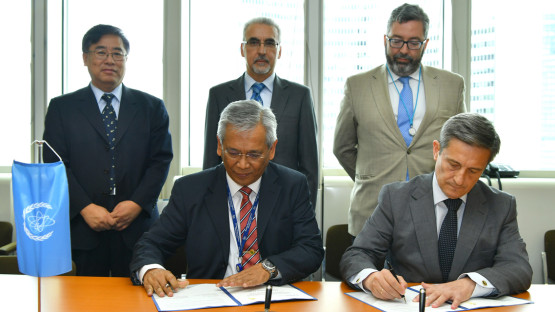An Operational Plan signed last week between the IAEA and the Guardia Civil — a law enforcement agency in Spain — sets out to strengthen nuclear security with a focus on Spanish-speaking countries. The cooperation will strengthen understanding, practices and procedures relating to the prevention and detection of nuclear security events, as well as ways to respond to them. The Plan is based on a Practical Arrangement signed between the IAEA and the Guardia Civil in September 2016.
“We can now call on the Guardia Civil’s nuclear security expertise when we provide assistance, particularly to Spanish-speaking countries,” said Nigel Tottie, senior nuclear security officer at the IAEA. The Operational Plan aims to support, among others, the implementation in Latin American countries of the IAEA’s Integrated Nuclear Security Support Plans (INSSP), which cover a range of activities in nuclear security — from legislative and regulatory framework to prevention, detection, response and sustainability.
Activities are also designed to increase IAEA resources committed to supporting the response to nuclear security events, especially in Spanish-speaking countries, and to enable the Guardia Civil’s explosives deactivation Chemical, Biological, Radiological, Nuclear (CADEX CBRN) training centre in Madrid to become an IAEA Collaborating Centre for selected Nuclear Security activities.
Currently, there is only one collaborating centre in the field of nuclear security: the Hungarian Academy of Sciences Centre for Energy Research (MTA EK), which is specialised in nuclear forensics, the science behind the examination of nuclear and other radioactive material as part of criminal or nuclear security investigation.
“The plan is to combine our excellent working relationship with law enforcement agencies in Latin American countries with the high standards and recognition of an international organization like the IAEA,” said Major General José Cuasante García at the Guardia Civil.
One challenge in nuclear security is identifying the right experts. “Nuclear security events involving material out of regulatory control can happen anywhere within a country, so we need to work with a wide range of experts, including those who have public law enforcement responsibilities, such as our colleagues from the Guardia Civil,” Tottie said.




